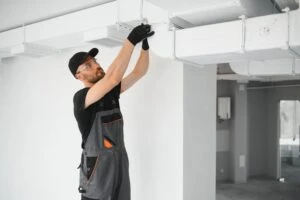
Choosing the best air conditioner for your home means comparing various factors, including brand, size, and features. What is a good SEER rating for your air conditioner, and why does it matter?
Ideally, your AC should have a SEER rating of 14 or higher to be energy efficient, but various factors play a role in this, and our Las Vegas AC repair company can help.
Understanding What a SEER Rating Means for Your Cooling System
When choosing an air conditioner for your home, you will likely need to consider numerous factors, including the warranty, brand, and consumer rating, but the system’s energy efficiency is critical.
If your system is more than 15 years old, replacing it with a more energy-efficient model could be ideal. To do that, you need to consider the SEER rating.
When you meet with our AC repair company in Las Vegas, Nevada, and we inform you that you may get better results by upgrading to a new system, one thing we will discuss with you is energy efficiency.
The Seasonal Energy Efficiency Ratio (SEER) rating provides insight into how efficient the system is. The higher the rating is, the more efficient it operates, meaning it uses less energy to cool your home.
As you consider your home’s heating and cooling options, let Ambient Edge offer guidance on how efficient your system should be.
Factors like your budget, home size, and energy usage can help you determine which SEER rating level is the best choice for your individual needs. We are happy to help you make those decisions.
How Efficient Your SEER Rating Should Be
Higher is better in most situations, but the more efficient the system, the higher the cost of purchasing it. However, the US Department of Energy has established guidelines for using SEER ratings when comparing cooling systems. As of January 2006, all installed residential air conditioners must have a SEER rating of at least 13.
However, it is also recommended that your system has a SEER rating of at least 14. The difference is that to be ENERGY STAR qualified, which means the system is efficient overall, it must have a higher SEER rating. In most situations, we do not recommend those under 14 since it can offer substantial savings.
Data from the Guide to Home Heating and Cooling from the division of the US Department of Energy shares that upgrading from a SEER 9 (which is found in some older homes) to a SEER 14 could lower your energy consumption by as much as 35%.
That is a substantial amount of money you will save, especially in our area, where temperatures can become very hot throughout the year.
If you are unsure which system is best suited for your needs, reach out to Ambient Edge, and we will be happy to offer insight into all of the options.
Is a SEER 15 Rating Worth it?
Higher is often better when it comes to what is a good SEER rating for your air conditioner, and we certainly want you to stay within budget.
Most of the time, a SEER 14 or 15 can be a good choice when you want to balance affordability and still save energy. Keep in mind that you can find those with a SEER 17 or higher rating as well, which tend to be highly efficient and best-case options even though they do cost more.
Why Homeowners Should Consider a Good SEER Rating
When budget is not a factor, a higher SEER rating can be well worth it. Many property owners favor those ratings that are closer to 15 to 18, and that can translate into a better level of value for your home if you plan to sell later. Why is this?
The SEER rating is one of the best ways to understand how much money you will spend on cooling your home each year. The higher the rating, the less energy the system uses to cool your home to the desired level. This leads to greater efficiency in keeping your home cooler even on the hottest days.
The least amount of energy used is best. That means your cooling costs for power drop significantly, and that keeps more money in your budget.
Each home’s needs are a bit different, and our air conditioning and heating experts often recommend a whole home energy audit to ensure you are getting the right level of heating and cooling efficiency for your home.
Should You Upgrade Just to Get a Lower Energy Usage Rating?
Most homeowners do not need to upgrade to a new HVAC if their only problem is a lower energy rating. While you could certainly do so and save money in the long term on energy costs, it is also helpful to consider other factors.
If your system is older, no longer operating effectively, or requires repairs every few weeks, it is time to upgrade. If your home’s energy costs have skyrocketed, and it is not because the cost of energy itself is up, then that could mean your system is no longer operating effectively.
You also want to consider the benefits of replacing your air conditioner if there are any concerns over the safety of it.
When you meet with our team at Ambient Edge, we will provide you with more insight into the best possible options for your home, including whether you will benefit from upgrading now.
We offer a free estimate and can help you determine if your current system can be improved upon. Reach out to us for a quote before you make the decision to invest and browse answers to your frequently asked questions.
Let Our Team Help You Find the Best Rating
Determining a good SEER rating for your air conditioner will keep your home’s energy costs in line with your budget. Ambient Edge can provide you with all the insight you need to keep your system operating at its best and using the least energy.
Contact us for a free quote on a new system.


